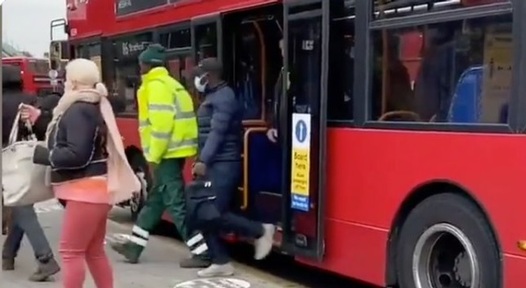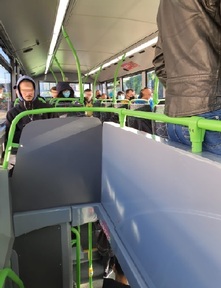Care boss angered by crowded buses wants PM to pay for bikes and cars for care workers
Prime Minister Boris Johnson's call for all who can’t work from home to go back to work on has led to packed buses and angered a home care boss who is demanding the government fund cycles or cars for care workers to keep them safe.

As restrictions on the lockdown eased on 13 May, buses and tubes in London were packed with passengers this morning, despite the government asking people to avoid public transport if possible.
Robert Stephenson-Padron, managing director of Penrose Care took to Twitter to share a photograph of his care worker’s commute to work.
He has this message for government: “A care worker sent us this photo of Bus 13 this morning. If this is the new normal then it is morally incumbent on HMG to provide grants to all health and social care workers to purchase vehicles or bicycles”.
Penrose Care, based in Hampstead in London, was rated Outstanding by the Care Quality Commission last year and currently has zero coronavirus cases. It currently has 19 staff and 17 home care clients, but 11 of those clients are currently isolating with family.
'Misguided policy'
Mr Robert Stephenson-Padron said: “I want to keep my staff and clients alive - that’s my focus at the moment.
“None of my care workers had problems with busy buses and tubes during the lockdown. When the care worker first got on the bus this morning it wasn’t busy but during her journey it got busier.
"The government should have kept it how it was with public transport used by key workers only. If the government is going to announce a misguided policy, they need to spend the money to keep people safe."

Mr Robert Stephenson-Padron believes special grants should be provided to social care providers registered with the CQC to fund extra costs linked to COVID-19.
“It’s an expensive option but if they don’t want people to use public transport, they should pay for cycles and cars to keep care workers safe”.
“We have told staff that if public transport gets too crowded we will get them Uber Medic taxis.”
His care workers’ journey time to visit home care clients typically cost £8-15 with Uber, Uber Medics offers a special 25 per cent discount for health and social care workers.
Having spent thousands of pounds extra on PPE and Uber Medic rides for his staff he says: “I can’t keep spending money for the government’s mistakes”.
No home testing kits means staff still must drive to testing centres
While the government promised self-testing kits for home care workers, Mr Stephenson-Padron has said none of his staff have received testing kits.
So far, only he and one care worker have been able to get a coronavirus test which had to be done at drive-in testing centres, which requires care staff to have a car.
The transport minister has announced £2bn to encourage people to walk and cycle to work, with £250m fast-tracked for pop-up bike lanes.
The funds announced at the weekend by the transport minister Grant Shapps is part of money already announced last February as part of a £5bn buses and cycling fund and is spread over five years - equating to £350m a year.
Londoners typically use public transport such as buses and the underground to get to work. Following the government’s latest back to work announcement, many employees feel they have no choice but to return to work but do not have access to cars.
But this morning, the transport secretary himself admitted he wouldn’t get on a packed bus or tube during the coronavirus pandemic, on the same morning the public was encouraged by the government to return to work.
Grant Shapps said people should avoid public transport except for essential journeys.
Boris in PMQs: 'I don't want to see crowding on public transport'
On the day of Prime Minister’s back to work announcement (10 May) health care worker Diana Brown (@B36Brown) tweeted: “Go to work but don’t use London Transport eeerrrhhhh there are people who travel to people's home as part of their job. This has not been properly thought through.”
Responding to criticism about packed buses, Boris Johnson, speaking during PMQs (13 May), said: "I don't want to see crowding on public transport in our capital or anywhere else.
"We're working very actively with TfL to ensure that what we do is we have more capacity, we discourage people from going to work during the peak and the operators particularly TfL lay on more tube trains when those are necessary throughout the day.
"A huge amount of work is being done. We also want to see proper marshalling at stations to prevent crowding of trains."
Like what you read? For more news click here
Latest News
 29-Jul-24
Dementia Bus gives carehome.co.uk staff insight into life with dementia
29-Jul-24
Dementia Bus gives carehome.co.uk staff insight into life with dementia
 01-Mar-24
Find out the top care homes in 2024
01-Mar-24
Find out the top care homes in 2024
 21-Mar-23
UK's top care homes in 2023 revealed
21-Mar-23
UK's top care homes in 2023 revealed
 03-Jan-23
carehome.co.uk launches free care helpline
03-Jan-23
carehome.co.uk launches free care helpline
 13-Dec-22
5 mins with Emily Whitehurst, chief operating officer for Constantia Healthcare
13-Dec-22
5 mins with Emily Whitehurst, chief operating officer for Constantia Healthcare